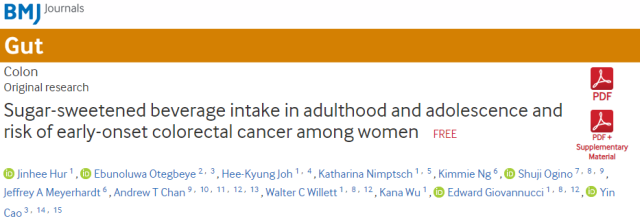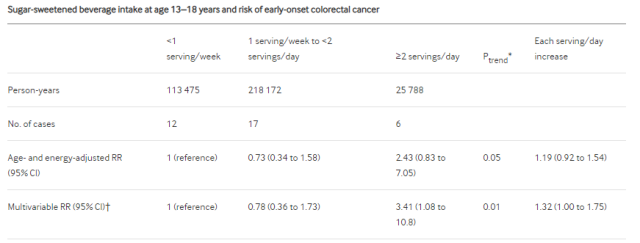Risks of bowel cancer doubles in future if much sugary drink when being young
- Normal Liver Cells Found to Promote Cancer Metastasis to the Liver
- Nearly 80% Complete Remission: Breakthrough in ADC Anti-Tumor Treatment
- Vaccination Against Common Diseases May Prevent Dementia!
- New Alzheimer’s Disease (AD) Diagnosis and Staging Criteria
- Breakthrough in Alzheimer’s Disease: New Nasal Spray Halts Cognitive Decline by Targeting Toxic Protein
- Can the Tap Water at the Paris Olympics be Drunk Directly?
RiRisks of bowel cancer doubles in future if much sugary drink when being young
- Should China be held legally responsible for the US’s $18 trillion COVID losses?
- CT Radiation Exposure Linked to Blood Cancer in Children and Adolescents
- FDA has mandated a top-level black box warning for all marketed CAR-T therapies
- Can people with high blood pressure eat peanuts?
- What is the difference between dopamine and dobutamine?
- How long can the patient live after heart stent surgery?
BMJ Sub-Journal: Risks of bowel cancer doubles in future if much sugary drink when being young.
The researchers emphasized that this observational study cannot prove that drinking sugary beverages can cause this type of cancer, nor can it prove that drinking milk or coffee has a protective effect, but replacing sugary beverages with sugar-free beverages such as milk and coffee is good for long-term health. Is a better choice.
In recent years, the consumption of sugar-sweetened beverages has continued to increase worldwide , and there is also evidence that high consumption of sugar-sweetened beverages can lead to increased risks of obesity and related diseases, type 2 diabetes, and cardiovascular disease. It is estimated that 184,000 deaths worldwide each year can be attributed to sugar-sweetened beverages.
Colorectal cancer is the most common cancer among women. According to the CA 2021 Cancer Statistics Report, colorectal cancer has become one of the three major cancers in women . In recent years, the diagnosis rate of colorectal cancer among people under the age of 50 has increased, and researchers are looking for reasons.
May 2021, Researchers from the University of Washington published a research paper titled “Sugar-sweetened beverage intake in adulthood and adolescence and risk of early-onset colorectal cancer among women” in the top journal BMJ “Gut” in the field of gastroenterology.
Studies have shown that women who consume a lot of sugar-sweetened beverages during adolescence (13-18 years) and adulthood increase their risk of colorectal cancer before the age of 50 .

The researchers analyzed data from 95,000 participants from the “Nurse Health Study II” , the participants’ food frequency questionnaires every four years, and reported their diet and alcohol consumption.
After the study followed the health of participants for an average of 24 years, 109 women developed bowel cancer before the age of 50.
Further analysis found that compared with women who drank less than 1 cup of sugar-sweetened beverages a week, women who drank 2 or more sugar-sweetened beverages a day more than doubled their risk of developing colorectal cancer before the age of 50. A cup of risk increases by 16% .
Not only that, during adolescence, from 13 to 18 years old, drinking sugary drinks every day, the risk of colorectal cancer before the age of 50 increased by 32% .

Sugar-sweetened beverage intake between 13-18 years of age and the risk of colorectal cancer
Conversely, replacing sugary drinks with coffee, semi-skimmed or whole milk can reduce the risk of early-onset bowel cancer by 17% to 36%.
The researchers emphasized that this observational study cannot prove that drinking sugary beverages can cause this type of cancer , nor can it prove that drinking milk or coffee has a protective effect, but replacing sugary beverages with sugar-free beverages such as milk and coffee is good for long-term health. Is a better choice .
From a health point of view, the World Health Organization recommends limiting daily sugar intake to around 50 grams, or even 25 grams at best. However, we are still far from this goal.
Paper link:
http://dx.doi.org/10.1136/gutjnl-2020-323450
(source:internet, reference only)
Disclaimer of medicaltrend.org
Important Note: The information provided is for informational purposes only and should not be considered as medical advice.



